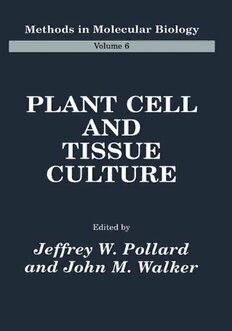Download Plant Cell and Tissue Culture (Methods in Molecular Biology Vol 6) PDF Free - Full Version
Download Plant Cell and Tissue Culture (Methods in Molecular Biology Vol 6) by Jeffrey W. Pollard, John M. Walker in PDF format completely FREE. No registration required, no payment needed. Get instant access to this valuable resource on PDFdrive.to!
About Plant Cell and Tissue Culture (Methods in Molecular Biology Vol 6)
Plant Cell and Tissue Culture continues the high standards of Humana's Methods in Molecular Biology series. Its step-by-step approach (a hallmark of the series) is applied to a wide range of basic laboratory techniques and culture conditions appropriate to plant cells. Because of the diversity of cell types, species, and culture methods, much of this volume is devoted to the culture of particular cell types and to the regeneration of these cells into whole plants. Special attention is also given to the genetic modification of plants, as well as to the economic significance of plant products. Chapters cover a wide range of topics and techniques, including:• tissue culture media and selection • cryopreservation • callus culture techniques • organ culture • embryogenesis • batch culture • large-scale culture • hormonal control • fertilization techniques • gene transfer • cell immobilization • production systems • cell product purification • DNA expression • electrofusion of plant cells • mutant selection • mutagenesis techniques • automation • transfer of nuclei • protoplast culture • media analysis • micropropagation. A detailed appendix lists the formulas for the most commonly employed plant cell media. Comprehensive, easy to follow, and a pleasure to use, Pollard and Walker's Plant Cell and Tissue Culture is an essential tool for everyone--at all levels of proficiency and experience--involved in plant culture.
Detailed Information
| Author: | Jeffrey W. Pollard, John M. Walker |
|---|---|
| Publication Year: | 1990 |
| ISBN: | 9780896031616 |
| Pages: | 1000 |
| Language: | English |
| File Size: | 38.25 |
| Format: | |
| Price: | FREE |
Safe & Secure Download - No registration required
Why Choose PDFdrive for Your Free Plant Cell and Tissue Culture (Methods in Molecular Biology Vol 6) Download?
- 100% Free: No hidden fees or subscriptions required for one book every day.
- No Registration: Immediate access is available without creating accounts for one book every day.
- Safe and Secure: Clean downloads without malware or viruses
- Multiple Formats: PDF, MOBI, Mpub,... optimized for all devices
- Educational Resource: Supporting knowledge sharing and learning
Frequently Asked Questions
Is it really free to download Plant Cell and Tissue Culture (Methods in Molecular Biology Vol 6) PDF?
Yes, on https://PDFdrive.to you can download Plant Cell and Tissue Culture (Methods in Molecular Biology Vol 6) by Jeffrey W. Pollard, John M. Walker completely free. We don't require any payment, subscription, or registration to access this PDF file. For 3 books every day.
How can I read Plant Cell and Tissue Culture (Methods in Molecular Biology Vol 6) on my mobile device?
After downloading Plant Cell and Tissue Culture (Methods in Molecular Biology Vol 6) PDF, you can open it with any PDF reader app on your phone or tablet. We recommend using Adobe Acrobat Reader, Apple Books, or Google Play Books for the best reading experience.
Is this the full version of Plant Cell and Tissue Culture (Methods in Molecular Biology Vol 6)?
Yes, this is the complete PDF version of Plant Cell and Tissue Culture (Methods in Molecular Biology Vol 6) by Jeffrey W. Pollard, John M. Walker. You will be able to read the entire content as in the printed version without missing any pages.
Is it legal to download Plant Cell and Tissue Culture (Methods in Molecular Biology Vol 6) PDF for free?
https://PDFdrive.to provides links to free educational resources available online. We do not store any files on our servers. Please be aware of copyright laws in your country before downloading.
The materials shared are intended for research, educational, and personal use in accordance with fair use principles.

